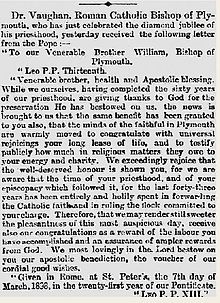William Vaughan (Bishop)
William Vaughan (born February 14, 1814 in London , † October 25, 1902 in Plymouth ) was from 1855 until his death the second bishop of the Roman Catholic diocese of Plymouth, founded in 1850, and is considered its real "father".
Life

Vaughan came from a family that had numerous bishops. He was the second eldest son of four sons and three daughters of William Michael Thomas John Vaughan and his wife Theresa Maria Weld. His nephew was Cardinal Herbert Vaughan . In 1838 he was ordained a priest . As in 1850, the Roman Catholic hierarchy restored in England was, he was a senior pastor at the Prokathedrale Holy Apostles of the diocese of Clifton in Clifton . There he received, after the papal appointment as Bishop of Plymouth on July 10, 1855, by Cardinal Wiseman on July 19, 1855, the episcopal ordination .
In 1870 he took part in the First Vatican Council .
During the 47 years of his episcopate, Vaughan organized and consolidated his young diaspora, which consisted mostly of poor Irish immigrants. In 1856 he laid the foundation stone of Plymouth Cathedral , and in 1880, in the year of his 25th bishopric, he celebrated its consecration after all the work was completed and all debts had been paid off . The monetary gifts on the occasion of this jubilee and his 50th jubilee as a priest in 1888 he turned to the cathedral.
When Vaughan took office there were 23 missions and 23 priests in the diocese of Plymouth . When he died in 1902 there were 100 priests, 13 male and 28 female monasteries, four orphanages, 27 elementary schools and five secondary schools.
Web links
- Entry for William Vaughan on catholic-hierarchy.org
- Biographical note (website of the Diocese of Plymouth, English)
| predecessor | Office | successor |
|---|---|---|
| George Errington |
Bishop of Plymouth 1855-1902 |
Charles Maurice Graham |
| personal data | |
|---|---|
| SURNAME | Vaughan, William |
| BRIEF DESCRIPTION | English Roman Catholic Bishop of Plymouth |
| DATE OF BIRTH | February 14, 1814 |
| PLACE OF BIRTH | London |
| DATE OF DEATH | October 25, 1902 |
| Place of death | Plymouth |